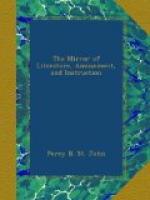Charles, now, and Louis—what a contrast! The first despised the pleasures of the table, abjured wine, and would, I dare say, just as soon have been without “a distinguishing taste” as with it. Your Bourbon, on the contrary, a five-mealed man, quaffing right Falernian night and day; and wisely esteeming the gratification of his palate of such importance, as absolutely to send from Lisle to Paris—distance of I know not how many score leagues—at a crisis, too, of peculiar difficulty—for a single pâte! “Go,” cried the illustrious exile to his messenger; “dispatch, mon enfant! Mount the tricolor! Shout Vive le Diable! Any thing! But be sure you clutch the precious compound! Napoleon has driven me from my throne; but he cannot deprive me of my appetite!” Here was courage! I challenge the most enthusiastic admirer of Charles to produce a similar instance of indifference to danger!
There is another trait in the character of Louis which equally demands our admiration, and proves that the indomitable firmness may be sometimes associated with the most sensitive and—I had almost said—infantine sensibility. Of course, it will be perceived that I allude to the peculiar tenderness by which that amiable prince was often betrayed, even into tears, upon occasions when ordinary minds would have manifested comparative nonchalance. I have been assured that Louis absolutely wept once at Hartwell, merely because oysters were out of season!—a testaceous production, to which he was remarkably attached, (whence his cognomen of Des Huîtres, by corruption Dix-huit;) so much so, indeed, as to be literally ready to eat them, whenever they were brought into his presence. It is said that this worthy descendant of the Good Henrí used to put a barrel of Colchester oysters daily hors de combat, merely to give him an appetite.
Monthly Magazine.
* * * * *




